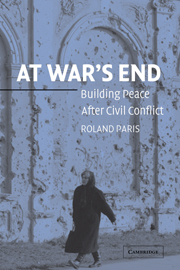Book contents
- Frontmatter
- Contents
- List of Figures
- Preface
- Introduction
- PART I FOUNDATIONS
- PART II THE PEACEBUILDING RECORD
- PART III PROBLEMS AND SOLUTIONS
- 9 The Limits of Wilsonianism: Understanding the Dangers
- 10 Toward More Effective Peacebuilding: Institutionalization Before Liberalization
- 11 Lessons Learned and Not Learned: Kosovo, East Timor, Sierra Leone, and Beyond
- Conclusion
- Bibliography
- Index
10 - Toward More Effective Peacebuilding: Institutionalization Before Liberalization
Published online by Cambridge University Press: 05 September 2012
- Frontmatter
- Contents
- List of Figures
- Preface
- Introduction
- PART I FOUNDATIONS
- PART II THE PEACEBUILDING RECORD
- PART III PROBLEMS AND SOLUTIONS
- 9 The Limits of Wilsonianism: Understanding the Dangers
- 10 Toward More Effective Peacebuilding: Institutionalization Before Liberalization
- 11 Lessons Learned and Not Learned: Kosovo, East Timor, Sierra Leone, and Beyond
- Conclusion
- Bibliography
- Index
Summary
Might another approach to peacebuilding be better suited to creating stable and lasting peace in war-shattered states? I shall begin by considering two sweeping alternatives to Wilsonianism. The first is to abandon liberalization as a core element of peacebuilding in favor of establishing authoritarian regimes with international military and financial backing. The other is the strategy of partition, or the physical separation of warring communities and perhaps the creation of new states. I conclude that neither of these strategies offers a sound basis for peacebuilding, although there are limited circumstances in which they might be warranted.
Second, I shall propose a more feasible and prudent approach to peacebuilding: a modified form of Wilsonianism. Peacebuilders should continue to seek to transform war-shattered states into liberal market democracies, but with a different technique – by constructing the foundations of effective political and economic institutions before the introduction of electoral democracy and market-oriented adjustment policies, a strategy that I call Institutionalization Before Liberalization (IBL). This approach rests, I believe, on a more realistic understanding than that which has guided the practice of peacebuilding to date. Rather than assuming that liberalization will foster peace in countries just emerging from civil wars, we should start from the assumption that liberalization is an inherently tumultuous and conflict-inducing process that is capable of undermining a fragile peace. The chapter concludes by considering three possible criticisms of the IBL strategy.
- Type
- Chapter
- Information
- At War's EndBuilding Peace after Civil Conflict, pp. 179 - 211Publisher: Cambridge University PressPrint publication year: 2004
- 1
- Cited by



